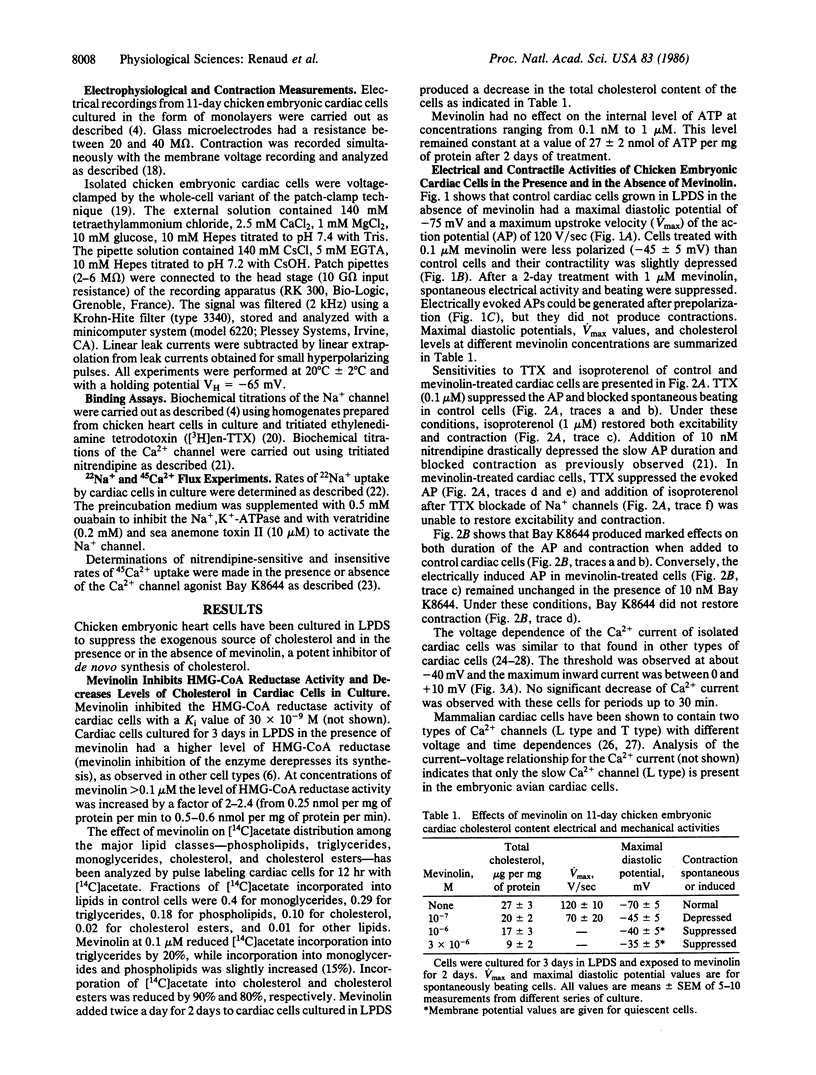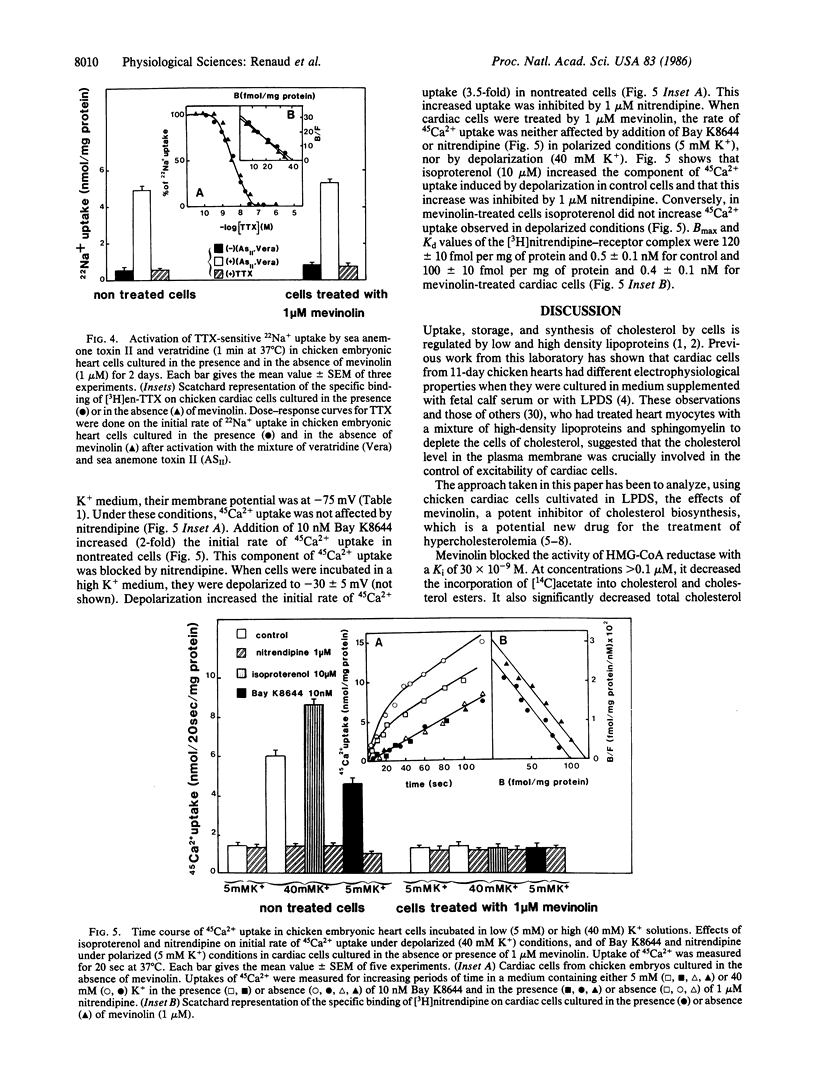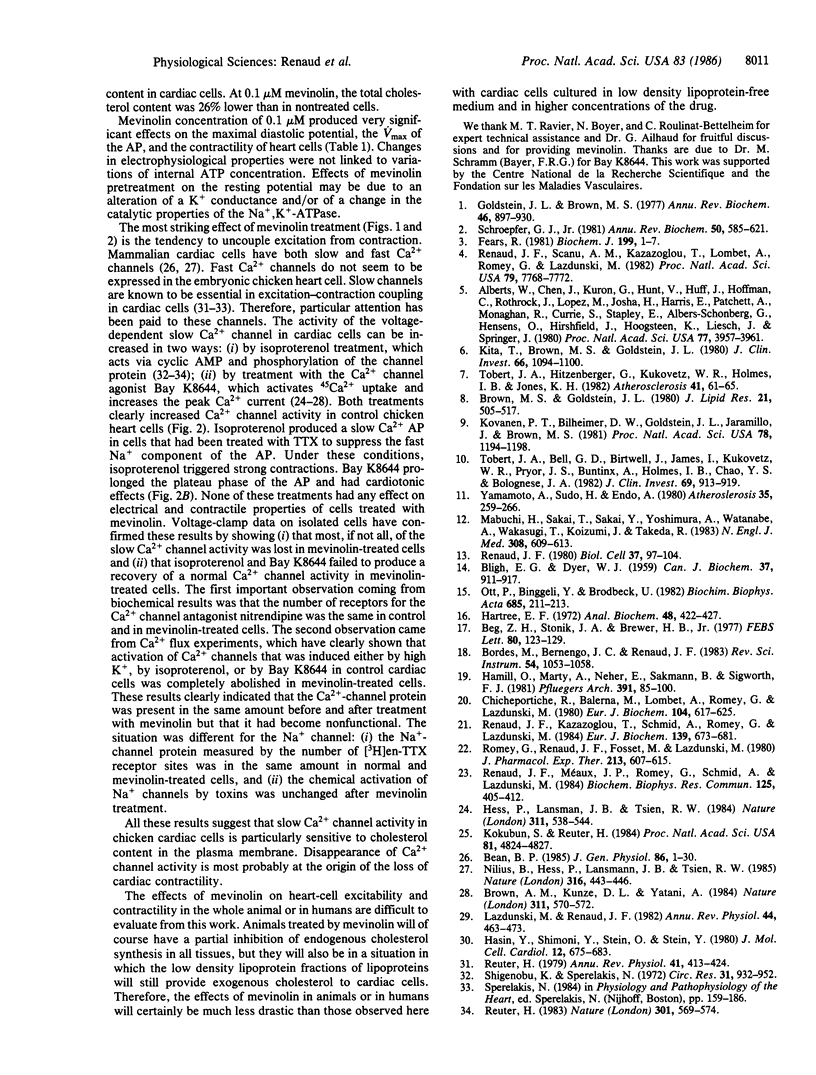Abstract
Mevinolin (MK803), a potent inhibitor of 3-hydroxy-3-methylglutaryl coenzyme A reductase (HMG-CoA reductase) (Ki, 30 X 10(-9) M), depressed de novo synthesis of cholesterol in 11-day chicken embryonic cardiac cells cultured in lipoprotein-deficient serum (LPDS). Cardiac cells exposed to different concentrations of mevinolin for 1-3 days presented different electrophysiological and mechanical properties: The resting membrane potential, the rate of increase, and the shape of the action potential and contractile properties were changed at concentrations as low as 0.1 microM mevinolin. At a concentration of 1 microM mevinolin, the cardiac cells became quiescent and electrical stimulation induced action potentials of short duration without contraction. Isoproterenol and Bay K8644 were unable to restore excitability and contraction. Although the number of receptors for the tritiated Ca2+ channel blocker nitrendipine was the same in control and in mevinolin-treated cells, voltage-clamp data on isolated cardiac cells and 45Ca2+ flux experiments on monolayers showed that most of the slow Ca2+ channel activity was lost in mevinolin-treated cells. These results suggest that the disappearance of Ca2+ channel activity is most probably at the origin of the loss of cardiac contractility.
Full text
PDF




Selected References
These references are in PubMed. This may not be the complete list of references from this article.
- Alberts A. W., Chen J., Kuron G., Hunt V., Huff J., Hoffman C., Rothrock J., Lopez M., Joshua H., Harris E. Mevinolin: a highly potent competitive inhibitor of hydroxymethylglutaryl-coenzyme A reductase and a cholesterol-lowering agent. Proc Natl Acad Sci U S A. 1980 Jul;77(7):3957–3961. doi: 10.1073/pnas.77.7.3957. [DOI] [PMC free article] [PubMed] [Google Scholar]
- BLIGH E. G., DYER W. J. A rapid method of total lipid extraction and purification. Can J Biochem Physiol. 1959 Aug;37(8):911–917. doi: 10.1139/o59-099. [DOI] [PubMed] [Google Scholar]
- Bean B. P. Two kinds of calcium channels in canine atrial cells. Differences in kinetics, selectivity, and pharmacology. J Gen Physiol. 1985 Jul;86(1):1–30. doi: 10.1085/jgp.86.1.1. [DOI] [PMC free article] [PubMed] [Google Scholar]
- Beg Z. H., Stonik J. A., Brewer H. B., Jr Purification and characterization of 3-hydroxy-3-methylglutaryl coenzyme A reductase from chicken liver. FEBS Lett. 1977 Aug 1;80(1):123–129. doi: 10.1016/0014-5793(77)80421-3. [DOI] [PubMed] [Google Scholar]
- Brown A. M., Kunze D. L., Yatani A. The agonist effect of dihydropyridines on Ca channels. Nature. 1984 Oct 11;311(5986):570–572. doi: 10.1038/311570a0. [DOI] [PubMed] [Google Scholar]
- Brown M. S., Goldstein J. L. Multivalent feedback regulation of HMG CoA reductase, a control mechanism coordinating isoprenoid synthesis and cell growth. J Lipid Res. 1980 Jul;21(5):505–517. [PubMed] [Google Scholar]
- Chicheportiche R., Balerna M., Lombet A., Romey G., Lazdunski M. Synthesis of new, highly radioactive tetrodotoxin derivatives and their binding properties to the sodium channel. Eur J Biochem. 1980 Mar;104(2):617–625. doi: 10.1111/j.1432-1033.1980.tb04466.x. [DOI] [PubMed] [Google Scholar]
- Fears R. The contribution of the cholesterol biosynthetic pathway to intermediary metabolism and cell function. Biochem J. 1981 Oct 1;199(1):1–7. doi: 10.1042/bj1990001. [DOI] [PMC free article] [PubMed] [Google Scholar]
- Goldstein J. L., Brown M. S. The low-density lipoprotein pathway and its relation to atherosclerosis. Annu Rev Biochem. 1977;46:897–930. doi: 10.1146/annurev.bi.46.070177.004341. [DOI] [PubMed] [Google Scholar]
- Hamill O. P., Marty A., Neher E., Sakmann B., Sigworth F. J. Improved patch-clamp techniques for high-resolution current recording from cells and cell-free membrane patches. Pflugers Arch. 1981 Aug;391(2):85–100. doi: 10.1007/BF00656997. [DOI] [PubMed] [Google Scholar]
- Hartree E. F. Determination of protein: a modification of the Lowry method that gives a linear photometric response. Anal Biochem. 1972 Aug;48(2):422–427. doi: 10.1016/0003-2697(72)90094-2. [DOI] [PubMed] [Google Scholar]
- Hasin Y., Shimoni Y., Stein O., Stein Y. Effect of cholesterol depletion on the electrical activity of rat heart myocytes in culture. J Mol Cell Cardiol. 1980 Jul;12(7):675–683. doi: 10.1016/0022-2828(80)90098-x. [DOI] [PubMed] [Google Scholar]
- Hess P., Lansman J. B., Tsien R. W. Different modes of Ca channel gating behaviour favoured by dihydropyridine Ca agonists and antagonists. Nature. 1984 Oct 11;311(5986):538–544. doi: 10.1038/311538a0. [DOI] [PubMed] [Google Scholar]
- Kita T., Brown M. S., Goldstein J. L. Feedback regulation of 3-hydroxy-3-methylglutaryl coenzyme A reductase in livers of mice treated with mevinolin, a competitive inhibitor of the reductase. J Clin Invest. 1980 Nov;66(5):1094–1100. doi: 10.1172/JCI109938. [DOI] [PMC free article] [PubMed] [Google Scholar]
- Kokubun S., Reuter H. Dihydropyridine derivatives prolong the open state of Ca channels in cultured cardiac cells. Proc Natl Acad Sci U S A. 1984 Aug;81(15):4824–4827. doi: 10.1073/pnas.81.15.4824. [DOI] [PMC free article] [PubMed] [Google Scholar]
- Kovanen P. T., Bilheimer D. W., Goldstein J. L., Jaramillo J. J., Brown M. S. Regulatory role for hepatic low density lipoprotein receptors in vivo in the dog. Proc Natl Acad Sci U S A. 1981 Feb;78(2):1194–1198. doi: 10.1073/pnas.78.2.1194. [DOI] [PMC free article] [PubMed] [Google Scholar]
- Lazdunski M., Renaud J. F. The action of cardiotoxins on cardiac plasma membranes. Annu Rev Physiol. 1982;44:463–473. doi: 10.1146/annurev.ph.44.030182.002335. [DOI] [PubMed] [Google Scholar]
- Mabuchi H., Sakai T., Sakai Y., Yoshimura A., Watanabe A., Wakasugi T., Koizumi J., Takeda R. Reduction of serum cholesterol in heterozygous patients with familial hypercholesterolemia. Additive effects of compactin and cholestyramine. N Engl J Med. 1983 Mar 17;308(11):609–613. doi: 10.1056/NEJM198303173081101. [DOI] [PubMed] [Google Scholar]
- Nilius B., Hess P., Lansman J. B., Tsien R. W. A novel type of cardiac calcium channel in ventricular cells. Nature. 1985 Aug 1;316(6027):443–446. doi: 10.1038/316443a0. [DOI] [PubMed] [Google Scholar]
- Ott P., Binggeli Y., Brodbeck U. A rapid and sensitive assay for determination of cholesterol in membrane lipid extracts. Biochim Biophys Acta. 1982 Feb 23;685(2):211–213. doi: 10.1016/0005-2736(82)90101-8. [DOI] [PubMed] [Google Scholar]
- Renaud J. F., Kazazoglou T., Schmid A., Romey G., Lazdunski M. Differentiation of receptor sites for [3H]nitrendipine in chick hearts and physiological relation to the slow Ca2+ channel and to excitation-contraction coupling. Eur J Biochem. 1984 Mar 15;139(3):673–681. doi: 10.1111/j.1432-1033.1984.tb08056.x. [DOI] [PubMed] [Google Scholar]
- Renaud J. F., Méaux J. P., Romey G., Schmid A., Lazdunski M. Activation of the voltage-dependent Ca2+ channel in rat heart cells by dihydropyridine derivatives. Biochem Biophys Res Commun. 1984 Nov 30;125(1):405–412. doi: 10.1016/s0006-291x(84)80382-4. [DOI] [PubMed] [Google Scholar]
- Renaud J. F., Scanu A. M., Kazazoglou T., Lombet A., Romey G., Lazdunski M. Normal serum and lipoprotein-deficient serum give different expressions of excitability, corresponding to different stages of differentiation, in chicken cardiac cells in culture. Proc Natl Acad Sci U S A. 1982 Dec;79(24):7768–7772. doi: 10.1073/pnas.79.24.7768. [DOI] [PMC free article] [PubMed] [Google Scholar]
- Reuter H. Calcium channel modulation by neurotransmitters, enzymes and drugs. Nature. 1983 Feb 17;301(5901):569–574. doi: 10.1038/301569a0. [DOI] [PubMed] [Google Scholar]
- Reuter H. Properties of two inward membrane currents in the heart. Annu Rev Physiol. 1979;41:413–424. doi: 10.1146/annurev.ph.41.030179.002213. [DOI] [PubMed] [Google Scholar]
- Romey G., Renaud J. F., Fosset M., Lazdunski M. Pharmacological properties of the interaction of a sea anemone polypeptide toxin with cardiac cells in culture. J Pharmacol Exp Ther. 1980 Jun;213(3):607–615. [PubMed] [Google Scholar]
- Schroepfer G. J., Jr Sterol biosynthesis. Annu Rev Biochem. 1981;50:585–621. doi: 10.1146/annurev.bi.50.070181.003101. [DOI] [PubMed] [Google Scholar]
- Shigenobu K., Sperelakis N. Calcium current channels induced by catecholamines in chick embryonic hearts whose fast sodium channels are blocked by tetrodotoxin or elevated potassium. Circ Res. 1972 Dec;31(6):932–952. doi: 10.1161/01.res.31.6.932. [DOI] [PubMed] [Google Scholar]
- Tobert J. A., Bell G. D., Birtwell J., James I., Kukovetz W. R., Pryor J. S., Buntinx A., Holmes I. B., Chao Y. S., Bolognese J. A. Cholesterol-lowering effect of mevinolin, an inhibitor of 3-hydroxy-3-methylglutaryl-coenzyme a reductase, in healthy volunteers. J Clin Invest. 1982 Apr;69(4):913–919. doi: 10.1172/JCI110530. [DOI] [PMC free article] [PubMed] [Google Scholar]
- Tobert J. A., Hitzenberger G., Kukovetz W. R., Holmes I. B., Jones K. H. Rapid and substantial lowering of human serum cholesterol by mevinolin (MK-803), an inhibitor of hydroxymethylglutaryl-coenzyme A reductase. Atherosclerosis. 1982 Jan;41(1):61–65. doi: 10.1016/0021-9150(82)90070-3. [DOI] [PubMed] [Google Scholar]
- Yamamoto A., Sudo H., Endo A. Therapeutic effects of ML-236B in primary hypercholesterolemia. Atherosclerosis. 1980 Mar;35(3):259–266. doi: 10.1016/0021-9150(80)90124-0. [DOI] [PubMed] [Google Scholar]


